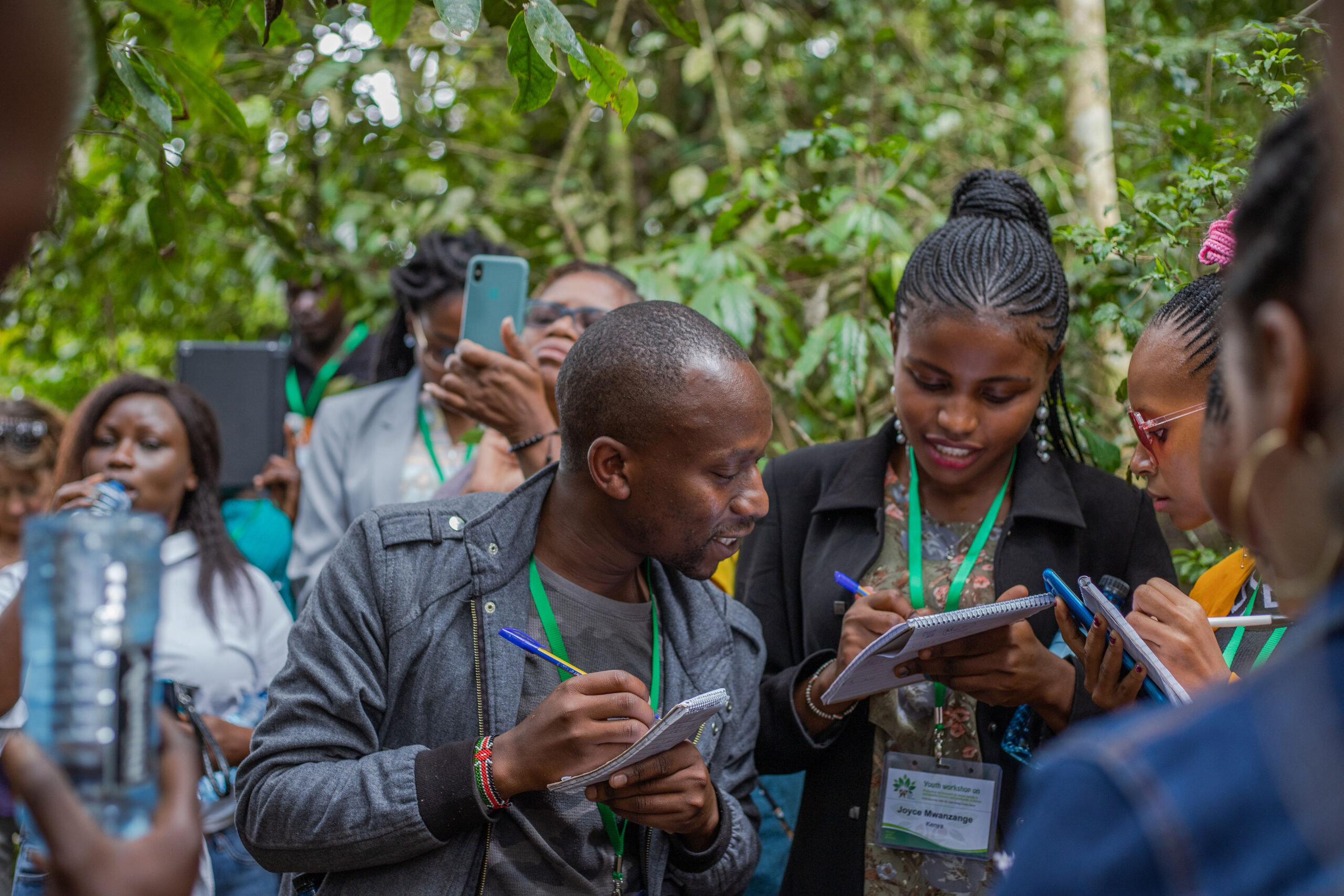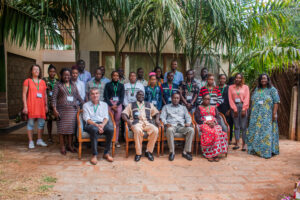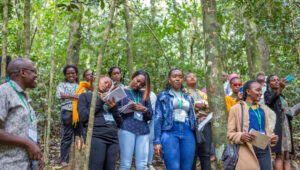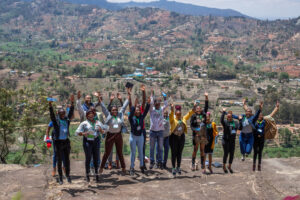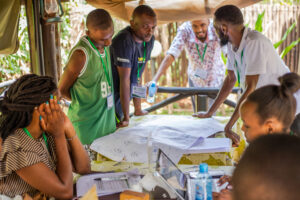Photo: Participants at the Aningeria adolfi/ muna tree in Ngangao forest; on the high peaks of Taita Hills in Southeast Kenya / AFF
Engaging youth in improving livelihoods and the environment through sustainable forestry in Kenya
Africa is the world’s youngest continent. Projections by the United Nations show that by 2030, young Africans are expected to make up 42 percent of the world’s youth and account for 75 percent of those under the age of 35. This “youth bulge” could either become a dividend or a liability for the continent – especially in the context of the current stress on natural resources.
Highlighting their role at a workshop held on 7-9 November 2022, young forestry leaders had the opportunity to share their experiences in forest-based livelihoods as well as their initiatives to respond to the impacts of climate change in the sector.
Titled “Promoting involvement of young people in sustainable forestry and livelihoods in Kenya,” the inaugural event brought together 19 participants both from rural and urban areas, for an interactive discussion on the potential role youth can play in ecosystems’ protection to hasten green transition in Kenya. It gave the youth a platform to find shared synergies in their action plans and gain an entry point for inclusive forest and tree-based value chain development.
Participants of the AfricanYouth4Forests workshop held on 7-9 November 2022 in Voi, Taita Taveta County, Kenya.
Speaking at the opening session, Prof. Godwin Kowero, Executive Secretary – CEO of the African Forest Forum (AFF) said that active engagement of the youth was key in restoring degraded forests in Kenya, sustaining provision of critical ecosystem services like clean water, fresh air, climate regulation and flood control. He called for a shift in focus towards commercial forestry for young people to spur growth of green enterprises that promote resilience of habitats while tackling poverty and unemployment.
Through the much-needed scientific knowledge on nature-based solutions, Prof. Anders Roos from the Swedish University of Agricultural Sciences (SLU), reiterated that youth have the creativity and innovation to unlock sustainable forest-based bio-economics. Further, they have the ability to mobilize and explore opportunities in value addition, product innovation, digitization, and small and medium enterprises based on Non-Timber Forest Products (NTFPs).
Joshua Cheboiwo, Director of Kenya Forestry Research Institute (KEFRI) affirmed that tapping into the youthful demographic would help the country achieve an ambitious 30 percent forest cover in the next decade. Kenya’s forest cover, that is equivalent to 8.83 percent of the country’s total landmass, contributes about 3.6 percent to the Gross Domestic Product (GDP) annually, besides providing 750,000 direct jobs. He said that supporting the youth to establish tree seedlings, participate in mass propagation of trees through tissue culture and growing of herbal products, would unleash new revenue streams.
“Our policy as a government is to involve many youths in efforts to expand the forest cover and adapt to climate change. There are countless green jobs for the youth that will be generated through reforestation,” said Cheboiwo.
The workshop raised visibility of grassroots activities in Kenya and, by extension, across Africa that were enhancing climate resilience against the backdrop of the 27th Conference of Parties to the UN Framework Convention on Climate Change summit held in Egypt at the same time. Success stories from youth-led forestry/conservation-based organizations and initiatives were highlighted.
In an effort to connect with the young participants’ realities and concerns, a guided tour through Ngangao forest led to an appreciation of environmental services that this natural forest resource provides. Home to endemic birds, giant caves, diverse butterfly species and gigantic trees, Ngangao forest is the second-largest moist forest fragments of the Taita Hills in Kenya. They also visited the area community resource centre and campsite for eco-tourism.
Young people on a guided tour of Ngangao forest, located in Taita Hills in Kenya
During the workshop, participants engaged in interactive sessions to address critical issues in the forestry sector. Such issues included the crucial role of young people in forestry, green entrepreneurship options that aligned with their interests, and how future African forests should be governed, protected and used. They worked in groups and came up with various illustrations, which conveyed their niche in forestry.
Participants during a group session at the AfricanYouth4forests workshop
Way forward for youth in forestry
Participants indicated their eagerness in engaging in the forestry sector with the precise message that the current generation must shape the future of forests for present and future generations. In their deliberations the youth made a resolve to contribute to forestry and drafted vision statements as follows:
- A world where young people are more involved in sustainable development by participating in green economy; and
- Improving forest cover to curb climate change effects for improved livelihoods.
Read more: https://english.news.cn/20221120/6e0323b2085f4ee49b6e9074967d6e56/c.html
Backgrounder
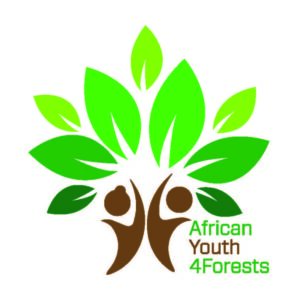 The workshop was organized by the African Forest Forum (AFF), the Swedish University of Agricultural Sciences (SLU) and Kenya Forestry Research Institute (KEFRI) within the framework of a joint pilot project dubbed “AfricanYouth4 Forests”. It was hosted by the County Government of Taita Taveta in Kenya.
The workshop was organized by the African Forest Forum (AFF), the Swedish University of Agricultural Sciences (SLU) and Kenya Forestry Research Institute (KEFRI) within the framework of a joint pilot project dubbed “AfricanYouth4 Forests”. It was hosted by the County Government of Taita Taveta in Kenya.
Grounded in knowledge co-creation and dialogue between researchers and young people, the project seeks to: (i) explore the roles of forests in young people’s lives and in their communities and society; (ii) inform and communicate with the youth about Kenya’s and Africa’s forests, their richness, and importance (iii) empower and encourage the youth to articulate their vision of future forests in Kenya and also on the continent, and to explore creative approaches for sustainable forest use.
Media Coverage
- Kenyan youth pledge support for nature-based solution to climate emergencies
- Africa youth engage in conservation
- Vijana wa mataifa mbali mbali wakongamana nchini Kenya kujadili masuala ibuka ya tabianchi
- Experts urge African youth to seek jobs in the forestry sector
Video messages
- Mr. Collins Towet , Founder OVAC plans on conservation in Africa as a mitigation to climate change.
- Marion Otema, Student at Strathmore University shares her views over conservation in Africa
- Prof Godwin Kowero, CEO African Forest Forum on the need for African youths in conservation
- Hon Granton Samboja , CECM Water & Environment Taita address to African youths on conservation
- Dr Doris Muta, Senior Programme Officer AFF, sharing her perspective over Forest in Africa

